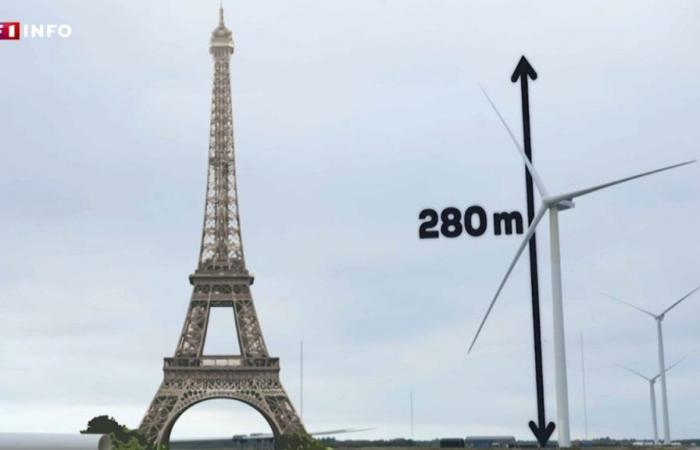The world’s largest wind turbines are being tested at a center in Denmark.
Some are almost the size of the Eiffel Tower!
To export these behemoths, major logistical adaptations had to be made.
Follow the full coverage
LE WE 20H
The tallest masts, the longest blades… It’s in the test center of DTU Wind – the department of wind and energy systems at the Technical University of Denmark – in Østerild, in northern Denmark, that the largest wind turbines on the world market are put to the test. In front of the TF1 8 p.m. camera, center manager Allan Vesth offers a privileged visit among these behemoths, which belong to different manufacturers.
“You have a first model 240 m high, here another 278 m”he indicates, before heading towards “the largest wind turbine in the world authorized on the market”which measures 280 m high. “We are not far from the height of the Eiffel Tower”slips Allan Vesteh. As a reminder, Notre Dame de Fer currently peaks at 330 m.
Unique conditions for testing wind turbines
Competing companies therefore agree to install their latest prototypes next to each other, because in this corner of Denmark, the wind conditions are unique to be able to measure the power, noise and lifespan of these models whose size is constantly progressing. In 1989, wind turbines were “only” 45 m high. They were therefore six times smaller than those of today.
“The higher you go, the stronger the wind, the greater the power and therefore the electricity production”explains Allan Vesteh. The largest wind turbine tested at the moment will be installed at sea. It alone will be able to supply 20,000 homes with electricity over a year.
Wind tunnel and storm simulator
Producing more with fewer wind turbines reduces energy costs. This is why manufacturers are embarking on this race for size. To achieve this, hundreds of researchers work behind the scenes. The world’s largest research center dedicated to wind turbines is located near Copenhagen, in Kongens Lyngby. Engineers from all continents are pushing the boundaries of physics a little more every day. They reproduce the pressure and force of the wind, under hangars or inside ultra-sophisticated machines, such as a wind tunnel or a storm simulator.
But is there a size limit for wind turbines? “The physical limits, for the moment, I’m not sure that there really are any. We are capable of drawing 200 meter blades on the screen of our computers. We could produce them tomorrow”estimates Anthony Fraisse, head of the composites section at DTU Wind.
However, in practice, engineers face some unresolved problems. Longer blades erode more, for example, and are less productive. Profitability is increasingly questioned. “Manufacturers are already selling larger wind turbines when not only are they not yet produced, but they have not even been tested in real conditions”underlines Kim Branner, head of the Test & design section at DTU Wind. Before warning: “But if they don’t do it, a competitor in Europe or China will do it for them.”
The challenge of exporting behemoths
In this race to excess, the most impressive adaptation is that of logistics. Not only must we be able to manufacture these behemoths, but above all we must transport and export them throughout the world. It is in the port of Odense, in the south of Denmark, that everything is centralized. This former shipyard has transformed in 15 years into a gigantic platform for the production and export of offshore wind turbines.
-
Read also
Renewable energies: what happens to first generation wind turbines after their dismantling?
The majority of equipment is therefore manufactured on site, such as bases for 1,200-ton wind turbines. The components are so large that, to adapt, it was even necessary to build a road last year to travel from the north to the south of the port. It is 45 m wide: it is therefore the widest in the whole country.






